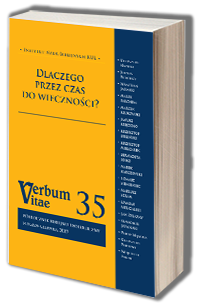„Wszystko ma swój czas" Patrystyczna egzegeza Księgi Eklezjastesa 3,1-8
“Everything has its own time”. A Patristic Exegesis of Ecclesiastes 3:1-8
Author(s): Mariusz SzramSubject(s): Christian Theology and Religion, Theology and Religion
Published by: Katolicki Uniwersytet Lubelski Jana Pawła II - Wydział Teologii
Keywords: Book of Ecclesiastes; time; patristic exegesis; Didymus the Blind; Gregory of Nyssa; Jerome
Summary/Abstract: From among the early Christian exegetical works treating the Book of Ecclesiastes, several manuscripts, some of them fragmentary, have been preserved. These include: a few fragments of Origen’s commentary; a large part of the commentary written by Didymus the Blind; homilies of St Gregory of Nyssa; a short literary comment attributed to St John Chrysostom; a moderately allegorical commentary of St Jerome; and the commentary of Gregory of Agrigentum, bishop of Sicily from the turn of the 6th and 7th centuries. Analysis of the commentaries on Qoh 3:1-8 contained in the above-mentioned works reveals the dualistic character of patristic exegesis of the biblical passus in question, specifically its use of both universal and individual approaches. On the one hand, the authors refer the text of Qoh 1–3 to a universal understanding of time, i.e. the whole of salvation history and the related activities of Divine Providence guiding the course of the historical process. On the other hand, they interpret this passage in relation to the spiritual life of every Christian, his deep relationship with God, the process of internal improvement, the fight against vices and the acquisition of virtues. The two dimensions of time interpenetrate each other: the individual path of man to perfection is at the same time part of God’s planned history of the salvation of humanity. Thus every action, both in the individual and the universal dimension, has its proper timing assigned by God.
Journal: Verbum Vitae
- Issue Year: 2019
- Issue No: 35
- Page Range: 345-372
- Page Count: 28
- Language: Polish

